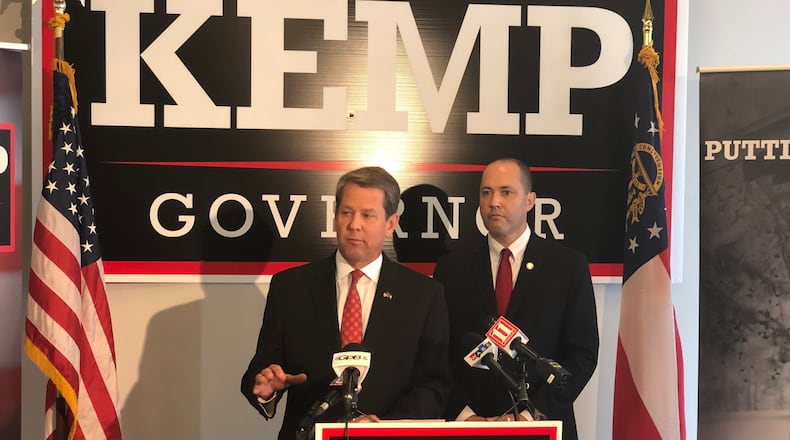Declaring gang violence a public safety "crisis," two of the state's top Republican candidates united Wednesday behind a plan to create a new unit in the state attorney general's office devoted to fighting the crime.
The joint event by Secretary of State Brian Kemp and Attorney General Chris Carr underscored the increasing role that public safety initiatives have played in Republican campaigns. Both candidates – Kemp is running for governor, Carr for a full term as attorney general – have seized on gang violence.
“They’re terrorizing our neighborhoods and filling our homes with fear,” Kemp said of gangs, adding that the new unit will “empower our officials to crush gangs in the court of law.”
Kemp's position is a contrast from his Democratic opponent, Stacey Abrams, a key supporter of Gov. Nathan Deal's criminal justice overhaul. She has focused her law-and-order policy on eliminating cash bail, reducing penalties for some nonviolent offenses and making it easier for released inmates to find jobs.
It also echoed the plan outlined by Carr's Democratic rival, Charlie Bailey, a former prosecutor who focused on gang crimes. Bailey announced his campaign in February with a pledge to create a unit in the Attorney General's office that would help local prosecutors more proactively prosecute gang members.
In an interview, Bailey called it a “craven political stunt” and questioned why Carr didn’t advocate for more resources to fight gangs earlier.
“He’s been there two years, and he’s never created this division that I’ve called for since the first day I get in the race,” said Bailey. “He’s never asked for the money or the authority. Words without deeds are dead.”
Carr said a new anti-gang network under his office’s oversight is essential to cracking down on violence that afflicts communities across the state. He said most of Georgia’s 159 counties – along with many schools – are hungry for more resources.
“You fight a network with a network,” he said. “And I’m going to work with Gov. Kemp to make sure we have an anti-gang network in the Department of Law.”
‘Elephant in the room’
Kemp, for his part, cast his “stop and dismantle” program as an extension of Deal’s eight-year criminal justice initiative that have diverted more nonviolent offenders from costly prison cells and toward more treatment programs.
“If we don’t address the elephant in the room now, we will regret it later,” said Kemp, adding: “This is what good government does. It’s all about building off what Gov. Deal started.”
Kemp had earlier pledged to create a statewide Gang Strike Team to help local authorities combat the crime, launch a public awareness campaign on the dangers of gang-related crime and pour an unspecified amount of state funding into a database created in 2010 to track gang members.
The proposal fits a familiar strategy for Kemp, who has echoed President Donald Trump's tough-talking initiatives since entering the race with a "Georgia First" platform a year ago. Trump made targeting MS-13 and other violent gangs a linchpin of his criminal justice policy.
Statistics on gang membership and gang-related crime aren't easily available. But a 2016 story in the Atlanta Journal-Constitution documented a rise in gang influence in everything from narcotics to identity theft. In that story, the FBI's Atlanta Safe Streets Gang Task Force estimated that there were up to 20,000 gang members in metro Atlanta – a significant jump since 2000.
Deal, meanwhile, has a different criminal justice wish-list.
Though he supports Kemp, he said in a recent interview that he hoped whoever wins will keep the criminal justice council he formed and consider another major step — reducing or eliminating more mandatory minimum sentences.
About the Author
The Latest
Featured




